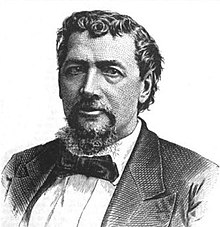William A. Phillips
William Addison Phillips | |
|---|---|
 | |
| Member of the U.S. House of Representatives from Kansas's at-large district | |
| In office March 4, 1873 – March 3, 1875 | |
| Preceded by | David Perley Lowe |
| Succeeded by | Seat redistricted as 1st District |
| Member of the U.S. House of Representatives from Kansas's 1st district | |
| In office March 4, 1875 – March 3, 1879 | |
| Preceded by | Redistricted from At-large district |
| Succeeded by | John Alexander Anderson |
| Member of the Kansas House of Representatives | |
| In office 1865 | |
| Personal details | |
| Born | January 14, 1824 Paisley, Scotland |
| Died | November 30, 1893 (aged 69) Fort Gibson, Oklahoma |
| Resting place | Salina, Kansas |
| Political party | Republican |
| Signature | |
| Military service | |
| Allegiance | United States |
| Branch/service | Union Army |
| Years of service | 1862–1865 |
| Rank | |
| Unit | 3rd Indian Home Guard |
| Battles/wars | American Civil War |
William Addison Phillips (1824–1893) was a Free-State Abolitionist journalist during the "Bleeding Kansas" period. He also served in the Civil War, ending the war as a colonel.
Biography
[edit]Born in Paisley, Scotland, Phillips attended the common schools of Paisley. He immigrated to the United States in 1838 with his parents, who settled in Randolph County, Illinois. He engaged in agricultural pursuits. He was employed as a newspaper correspondent 1845–1862. He studied law. He was admitted to the bar in 1855 and commenced practice in Lawrence, Kansas, working also as a correspondent for the New York Tribune. He was first justice of the Kansas Supreme Court under the Leavenworth Constitution. In 1858, he settled and founded the city of Salina, Kansas with a wagon circle against constant threat by hostile tribes.[1][2] During the American Civil War, though offered a large sum to be a correspondent at the front, he entered the Union Army as a volunteer, and raised some of the first troops in Kansas in 1861. He was a major in the 1st Indian Home Guard. He was promoted to colonel and served as commander of the Cherokee Indian Regiment in the 3rd Indian Home Guard.[3] He served as prosecuting attorney of Cherokee County in 1865. He served in the state House of Representatives in 1865.
He was elected as a Republican to the Forty-third, Forty-fourth, and Forty-fifth Congresses (March 4, 1873 – March 3, 1879). He was an unsuccessful candidate for renomination in 1878. After leaving Congress, he was attorney for the Cherokee Indians at Washington, D.C. He was an unsuccessful candidate for election to Congress in 1890. He died at Fort Gibson, Muskogee County, Indian Territory (now Oklahoma), November 30, 1893. He was interred in Gypsum Hill Cemetery, Salina, Kansas.
The city of Phillipsburg, Kansas was named in honor William A. Phillips.
References
[edit]- ^ Lichti, Carol (February 25, 1996). "On Hallowed Ground : Story of Indian Rock and Lakewood". The Salina Journal. Salina, Kansas. p. 47. Retrieved December 1, 2021 – via Newspapers.com.
As news of the battle spread, the potential for settlement lured Phillips, who was in Lawrence, to return to the area where Salina would be founded.
- ^ "Salina History". City of Salina, Kansas. Archived from the original on March 5, 2014. Retrieved March 5, 2014.
- ^ "William Addison Phillips". Kansas Historical Society. Retrieved April 10, 2022.
Bibliography
[edit]- United States Congress. "William A. Phillips (id: P000315)". Biographical Directory of the United States Congress.
- Kansas cyclopedia
- Rines, George Edwin, ed. (1920). . Encyclopedia Americana.
External links
[edit]![]() This article incorporates public domain material from the Biographical Directory of the United States Congress
This article incorporates public domain material from the Biographical Directory of the United States Congress
- 1824 births
- 1893 deaths
- People from Kansas Territory
- Scottish emigrants to the United States
- Republican Party members of the Kansas House of Representatives
- Politicians from Salina, Kansas
- People from Paisley, Renfrewshire
- People of Kansas in the American Civil War
- Union army colonels
- Republican Party members of the United States House of Representatives from Kansas
- American city founders
- 19th-century members of the United States House of Representatives
- 19th-century members of the Kansas Legislature


